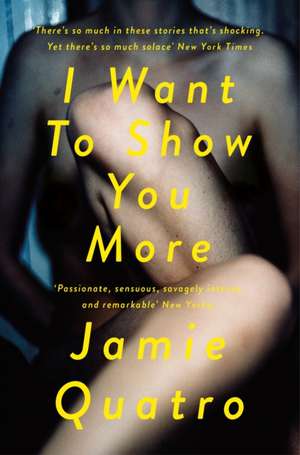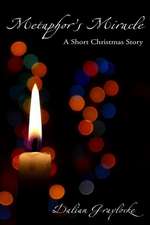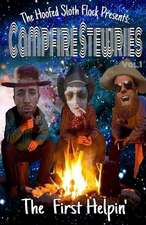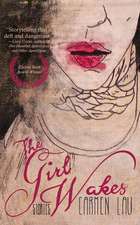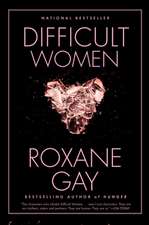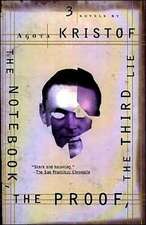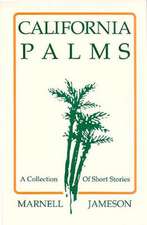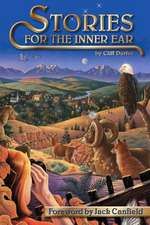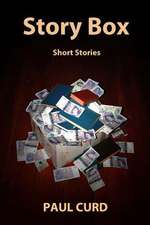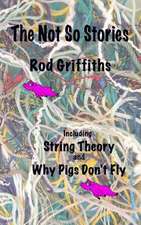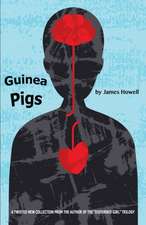I Want To Show You More
Autor Jamie Quatroen Limba Engleză Paperback – 8 ian 2020
| Toate formatele și edițiile | Preț | Express |
|---|---|---|
| Paperback (2) | 38.48 lei 22-36 zile | +25.09 lei 5-11 zile |
| Pan Macmillan – 8 ian 2020 | 38.48 lei 22-36 zile | +25.09 lei 5-11 zile |
| Grove Atlantic – 13 ian 2014 | 82.11 lei 22-36 zile |
Preț: 38.48 lei
Preț vechi: 56.76 lei
-32% Nou
Puncte Express: 58
Preț estimativ în valută:
7.36€ • 7.67$ • 6.12£
7.36€ • 7.67$ • 6.12£
Carte disponibilă
Livrare economică 20 ianuarie-03 februarie 25
Livrare express 03-09 ianuarie 25 pentru 35.08 lei
Preluare comenzi: 021 569.72.76
Specificații
ISBN-13: 9781509859009
ISBN-10: 1509859004
Pagini: 206
Dimensiuni: 132 x 198 x 20 mm
Greutate: 0.17 kg
Editura: Pan Macmillan
ISBN-10: 1509859004
Pagini: 206
Dimensiuni: 132 x 198 x 20 mm
Greutate: 0.17 kg
Editura: Pan Macmillan
Recenzii
"[With its] impressive agility and inventiveness . . . I Want to Show You More is an obsessive first collection that feels like a fifth or sixth. It is a dogged, brutally thoughtful piece of work, and gives us a writer of great originality and apparent artistic maturity who seems to have come out of nowhere. . . . Strange, thrilling, and disarmingly honest . . . Quatro hits the right balance, giving us the closet thing I've seen in years to Donald Barthelme's insouciance, sweetness, and ominousness. . . . Provides the most engaging literary treatment of Christianity since O'Connor, without a hint of the condescension the subject often receives in contemporary fiction. . . . [Quatro's] flights of fancy are never ostentatious or arbitrary; instead they grow naturally out of the emotional and psychological states of her characters. Readers may hope to see more of this hallucinatory mode from her, but—if they're like me—they will welcome whatever they can get."—J. Robert Lennon, The New York Times Book Review
"The best stories in Jamie Quatro's first collection, I Want to Show You More, are about adultery. They are passionate, sensuous, savagely intense, and remarkable for their brave dualism. . . . Moves between carnality and spirit like some franker, modernized Flannery O'Connor tale . . . Quatro has a poet's compound eye . . . [and] fearless lyricism. . . . Expansive, joyful, with forgiveness supplanting ruination. Who needs the New Testament? In Quatro's world, hard Genesis is always making way for the softer Song of Solomon: 'I sat down under his shadow with great delight, and his fruit was sweet to my taste.'"—James Wood, The New Yorker
“Quatro’s language is admirably light on its feet. Hers is the consummate prose that doesn’t call attention to itself with verbosity or sparsity. Her descriptions are simple, selective and always hit their mark.” —Kelsey Joseph, Los Angeles Review of Books
"Vivid . . . Arresting . . . Quatro very much establishes her own distinctive voice and style. . . . A luminous collection that announces a unique literary talent. Quatro's stories dazzle and shine."—S. Kirk Walsh, San Francisco Chronicle
"Subtle, sexy, and reflective . . . Quatro is incisive on technology and our new varities of instant gratification. . . . Quatro's stories [have] led some to compare her work to that of Walker Percy and Flannery O'Connor. I also picked up metal-detector traces of Jayne Anne Phillips . . . and of Lorrie Moore's pulverizing wit. . . . In order to be good at big things, writes must be good at small ones. Quatro's details resonate. . . . There's so much in these stories that's shocking. Yet there's so much solace."—Dwight Garner, The New York Times
"Haunting and sharp . . . [reminiscent] of the dark-meets-light style of Lydia Davis or Alice Munro—but it leaves room for zingers, too. Quatro is so good . . . the title of this debut collection isn't just a tease."—Julie Vadnal, Elle
"Delicious reading . . . [An] impressive debutabout the shortcomings of people who wrestle with angels, and usually lose."—Amy Gentry, Chicago Tribune
"Shattering and exceptional . . . The effect of this intersection of the domestic with sex and with ecstatic faith was, for me, a freakily new reading experience. . . . Quatro shoves us close to the grotesqueness of our desires. . . . Tense and musical."—Karen Long, The Plain Dealer (Cleveland)
"Occasionally, a first book of short stories can shake the world awake with its extraordinarily singular vision and voice, reinvigorating language. Jamie Quatro’s I Want to Show You More is such a book—and holy fuck, is it. . . . Startling, heartrending, and extraordinarily sexy . . . [with] allegorical scene[s] worthy of Kafka or Donald Barthelme."—Baynard Woods, Baltimore City Paper
“Like George Saunders, she's in tune with the warped patois of 21st-century life, holy, precious, teeming with energy, but clear only in contradiction… Her epiphanies come with a holy sense of wonder, giving these superb 14 stories a holistic feel.” —The American | In Italia
"Much of the tension in these stories stems from characters realizing that what they’ve long considered God’s plan can theoretically be molded to match their own desires. What Quatro renders so accurately is the power and pain that comes with such a realization. . . . These stories are bold (and wise) in their portrayal of how, when we want to find a sign, we can usually make ourselves find it. Many comparisons will be made between Quatro’s and Flannery O’Connor’s treatments of religion and faith; they are all accurate and deserved. But this book pushes past that inheritance by examining how it holds up it in our time, when we’re effortlessly connected by technology, when affairs (or almost-affairs) can be conducted safely (or almost safely) from hundreds of miles away."—Jennine Capo Crucet, The L Magazine
"Dark, bizarre, and highly sexual . . . Some stories are uncomfortable, pushing the limit with their sheer oddity and disregard for social norms. But isn’t that the point?"—Lindsay Deutsch, USA Today (3 stars)
"Quatro has accomplished a rare paradox: [her] collection is stitched together and, yet, it's loose and baggy, letting in a lot of surprise . . . the variety of stories and styles soliciting and intensifying the readers imaginative engagement."—Nine Schuyler, The Rumpus
"Deeply intriguing . . . Subtly metamorphosing . . . Shimmers with touches of Flannery O'Connor and George Saunders . . . [Quatro's] compelling moral dilemmas yoke bizarreness with authenticity."—Donna Seaman, Booklist
"A brilliant new voice in American fiction has arrived. Bright, sharp, startling, utterly distinctive, passionate, and secretive, Jamie Quatro's stories are missives from deep within the landscape of American womanhood. They take you by the heart and throat, shake you awake, and ask you to ponder the mysteries of love, parenthood, and marriage. She has earned a place alongside Amy Hempel, Lydia Davis, and Alice Munro."—David Means
"[Quatro's] stories are uncensored, sometimes eccentric explorations of life—its darkness and brilliance."—Oxford American
"Fasten your seat belt: Jamie Quatro is a writer of great talent who knows how to take a dark turn without ever tapping the brakes and then bring you back into daylight with breathtaking precision. These amazing stories explore the human boundaries between the physical world and the spiritual—lust, betrayal, and loss in perfect balance with love, redemption, and grace."—Jill McCorkle
"Quatro maps a twinkling constellation of modern-day desire, paranoia, and grief against an inky background of Souther religious and historical fervor. But the gothic beauty and bittersweet humor of her style are the real stars of this arresting debut."—Bryan Lowder, NY1
"Yowza . . . This one is going to be big. . . . It's so good, I kind of want to lick it."
—Rebecca Joines Schinsky, Book Riot, who in a second review commented:
"I knew when I read this collection that it was going to be one of my favorite books of the year. I also knew that it was going to be big (I don’t say I want to lick just any old book). . . . Quatro’s short stories are knock-your-socks-off good, and they deserve every bit of praise they’re garnering. I’ve run out of ways to say THIS BOOK IS GOOD GO READ IT, so just do it, okay?"
"These are stories that make you stop whatever you're doing and read. They show us who we are at our better moments and those other moments too. These are delightful stories for this brand new century, from an author unafraid to face it. I salute a brilliant new American writer."—Tom Franklin
"The characters in these absolutely unique stories live at a nearly intolerable level of intensity, stretched on a self-created rack between faith and sexuality—and they're even smart enough to be conflicted about whether or not there’s a conflict. Jamie Quatro spares us neither the strangeness of their experience nor its discomfiting familiarity. She observes them with a cool, comic yet compassionate eye, and shapes the raw material of their passionate strivings with a steady, skillful hand—a miracle in which any reader can believe."—David Gates
"Jamie Quatro's stories are about religion and children and sex and death and infidelity and God, and together they create one of the most authentically horrifying portraits of modern American adulthood I’ve ever read. Did I mention these stories are also very, very funny? Ladies and gentlemen, this is what short fiction is for."—Tom Bissell
"Exquisitely crafted, the characters here are as complex, real, and finely drawn as you'll find. No hyperbole here: Jamie Quatro is an outstanding new talent."—Elizabeth Crane
"With her wild and dark imagination, Quatro has crafted highly original, thought-provoking, and deeply moving stories about faith, marriage, infidelity, sex, and death. This is bold, daring fiction."—The Columbus Dispatch
"Quatro has mastered the art of the double take—that whiplash of recognition that gets the reader first at the level of the sentence, then, with extra reward, at story's end. The author pushes fearlessly, cape close to horns, blade held high and at risky angles. An impressive debut."—Sven Birkerts
"From under the placid surface of Quatro's stories sentences of astonishing strangeness startle the pond and serve as reminders of the dangerous, unknowable human heart. . . . Here is a new talent with work made to last."—Christine Schutt
"I keep saying, 'God almighty, that's a great story' after I finish one."—George Singleton
"A remarkable debut by an important new voice . . . Quatro [has] a mature understanding of how we handle disappointment and how, quite often, we take refuge in the most unhelpful places. How we feel doesn't affect our lives nearly so much as where we take our feelings."—Patrick Ryan, The Toronto Star
"The best stories in Jamie Quatro's first collection, I Want to Show You More, are about adultery. They are passionate, sensuous, savagely intense, and remarkable for their brave dualism. . . . Moves between carnality and spirit like some franker, modernized Flannery O'Connor tale . . . Quatro has a poet's compound eye . . . [and] fearless lyricism. . . . Expansive, joyful, with forgiveness supplanting ruination. Who needs the New Testament? In Quatro's world, hard Genesis is always making way for the softer Song of Solomon: 'I sat down under his shadow with great delight, and his fruit was sweet to my taste.'"—James Wood, The New Yorker
“Quatro’s language is admirably light on its feet. Hers is the consummate prose that doesn’t call attention to itself with verbosity or sparsity. Her descriptions are simple, selective and always hit their mark.” —Kelsey Joseph, Los Angeles Review of Books
"Vivid . . . Arresting . . . Quatro very much establishes her own distinctive voice and style. . . . A luminous collection that announces a unique literary talent. Quatro's stories dazzle and shine."—S. Kirk Walsh, San Francisco Chronicle
"Subtle, sexy, and reflective . . . Quatro is incisive on technology and our new varities of instant gratification. . . . Quatro's stories [have] led some to compare her work to that of Walker Percy and Flannery O'Connor. I also picked up metal-detector traces of Jayne Anne Phillips . . . and of Lorrie Moore's pulverizing wit. . . . In order to be good at big things, writes must be good at small ones. Quatro's details resonate. . . . There's so much in these stories that's shocking. Yet there's so much solace."—Dwight Garner, The New York Times
"Haunting and sharp . . . [reminiscent] of the dark-meets-light style of Lydia Davis or Alice Munro—but it leaves room for zingers, too. Quatro is so good . . . the title of this debut collection isn't just a tease."—Julie Vadnal, Elle
"Delicious reading . . . [An] impressive debutabout the shortcomings of people who wrestle with angels, and usually lose."—Amy Gentry, Chicago Tribune
"Shattering and exceptional . . . The effect of this intersection of the domestic with sex and with ecstatic faith was, for me, a freakily new reading experience. . . . Quatro shoves us close to the grotesqueness of our desires. . . . Tense and musical."—Karen Long, The Plain Dealer (Cleveland)
"Occasionally, a first book of short stories can shake the world awake with its extraordinarily singular vision and voice, reinvigorating language. Jamie Quatro’s I Want to Show You More is such a book—and holy fuck, is it. . . . Startling, heartrending, and extraordinarily sexy . . . [with] allegorical scene[s] worthy of Kafka or Donald Barthelme."—Baynard Woods, Baltimore City Paper
“Like George Saunders, she's in tune with the warped patois of 21st-century life, holy, precious, teeming with energy, but clear only in contradiction… Her epiphanies come with a holy sense of wonder, giving these superb 14 stories a holistic feel.” —The American | In Italia
"Much of the tension in these stories stems from characters realizing that what they’ve long considered God’s plan can theoretically be molded to match their own desires. What Quatro renders so accurately is the power and pain that comes with such a realization. . . . These stories are bold (and wise) in their portrayal of how, when we want to find a sign, we can usually make ourselves find it. Many comparisons will be made between Quatro’s and Flannery O’Connor’s treatments of religion and faith; they are all accurate and deserved. But this book pushes past that inheritance by examining how it holds up it in our time, when we’re effortlessly connected by technology, when affairs (or almost-affairs) can be conducted safely (or almost safely) from hundreds of miles away."—Jennine Capo Crucet, The L Magazine
"Dark, bizarre, and highly sexual . . . Some stories are uncomfortable, pushing the limit with their sheer oddity and disregard for social norms. But isn’t that the point?"—Lindsay Deutsch, USA Today (3 stars)
"Quatro has accomplished a rare paradox: [her] collection is stitched together and, yet, it's loose and baggy, letting in a lot of surprise . . . the variety of stories and styles soliciting and intensifying the readers imaginative engagement."—Nine Schuyler, The Rumpus
"Deeply intriguing . . . Subtly metamorphosing . . . Shimmers with touches of Flannery O'Connor and George Saunders . . . [Quatro's] compelling moral dilemmas yoke bizarreness with authenticity."—Donna Seaman, Booklist
"A brilliant new voice in American fiction has arrived. Bright, sharp, startling, utterly distinctive, passionate, and secretive, Jamie Quatro's stories are missives from deep within the landscape of American womanhood. They take you by the heart and throat, shake you awake, and ask you to ponder the mysteries of love, parenthood, and marriage. She has earned a place alongside Amy Hempel, Lydia Davis, and Alice Munro."—David Means
"[Quatro's] stories are uncensored, sometimes eccentric explorations of life—its darkness and brilliance."—Oxford American
"Fasten your seat belt: Jamie Quatro is a writer of great talent who knows how to take a dark turn without ever tapping the brakes and then bring you back into daylight with breathtaking precision. These amazing stories explore the human boundaries between the physical world and the spiritual—lust, betrayal, and loss in perfect balance with love, redemption, and grace."—Jill McCorkle
"Quatro maps a twinkling constellation of modern-day desire, paranoia, and grief against an inky background of Souther religious and historical fervor. But the gothic beauty and bittersweet humor of her style are the real stars of this arresting debut."—Bryan Lowder, NY1
"Yowza . . . This one is going to be big. . . . It's so good, I kind of want to lick it."
—Rebecca Joines Schinsky, Book Riot, who in a second review commented:
"I knew when I read this collection that it was going to be one of my favorite books of the year. I also knew that it was going to be big (I don’t say I want to lick just any old book). . . . Quatro’s short stories are knock-your-socks-off good, and they deserve every bit of praise they’re garnering. I’ve run out of ways to say THIS BOOK IS GOOD GO READ IT, so just do it, okay?"
"These are stories that make you stop whatever you're doing and read. They show us who we are at our better moments and those other moments too. These are delightful stories for this brand new century, from an author unafraid to face it. I salute a brilliant new American writer."—Tom Franklin
"The characters in these absolutely unique stories live at a nearly intolerable level of intensity, stretched on a self-created rack between faith and sexuality—and they're even smart enough to be conflicted about whether or not there’s a conflict. Jamie Quatro spares us neither the strangeness of their experience nor its discomfiting familiarity. She observes them with a cool, comic yet compassionate eye, and shapes the raw material of their passionate strivings with a steady, skillful hand—a miracle in which any reader can believe."—David Gates
"Jamie Quatro's stories are about religion and children and sex and death and infidelity and God, and together they create one of the most authentically horrifying portraits of modern American adulthood I’ve ever read. Did I mention these stories are also very, very funny? Ladies and gentlemen, this is what short fiction is for."—Tom Bissell
"Exquisitely crafted, the characters here are as complex, real, and finely drawn as you'll find. No hyperbole here: Jamie Quatro is an outstanding new talent."—Elizabeth Crane
"With her wild and dark imagination, Quatro has crafted highly original, thought-provoking, and deeply moving stories about faith, marriage, infidelity, sex, and death. This is bold, daring fiction."—The Columbus Dispatch
"Quatro has mastered the art of the double take—that whiplash of recognition that gets the reader first at the level of the sentence, then, with extra reward, at story's end. The author pushes fearlessly, cape close to horns, blade held high and at risky angles. An impressive debut."—Sven Birkerts
"From under the placid surface of Quatro's stories sentences of astonishing strangeness startle the pond and serve as reminders of the dangerous, unknowable human heart. . . . Here is a new talent with work made to last."—Christine Schutt
"I keep saying, 'God almighty, that's a great story' after I finish one."—George Singleton
"A remarkable debut by an important new voice . . . Quatro [has] a mature understanding of how we handle disappointment and how, quite often, we take refuge in the most unhelpful places. How we feel doesn't affect our lives nearly so much as where we take our feelings."—Patrick Ryan, The Toronto Star
Extras
Caught Up
The vision started coming when I was nine. It was always the same: I was alone, standing on the brick patio in front of our house, watching thick clouds above the mountains turn shades of red and purple, then draw themselves together and spiral. Whirlpool, hurricane, galaxy. The wind picked up, my hair whipped my face, and I felt—knew—that the world was on the cusp of a cataclysm. Then came a tugging in my middle, as if I were a kite about to be yanked up by a string attached just below my navel. Takeoff was imminent; all I had to do was surrender—close my eyes, relax my limbs—and I would be catapulted, belly-first, into the vortex.
The vision ended there. I never left the patio.
When I told my mother, she said, God speaks to his children in dreams. She said we should always be ready for the Lord’s return: lead a clean life and stay busy with our work, keeping an eye skyward. I pictured my mother up on our roof, sitting in a folding chair, snapping beans.
I don’t remember when the vision stopped coming. Somewhere along the way I forgot about it. I grew up and married a good man who cries at baptisms and makes our children carry spiders outside instead of smashing them; who never goes to sleep without kissing some part of my body. He says he wants to know, on his deathbed, that his lips have touched every square inch. In grad school, when I told him I was attracted to one of his friends who’d made a pass at me, he said, “Show me what you would do with him, if you could.”
Three years ago—seventeen years into this marriage—I fell in love with a man who lives nine hundred miles away. Ten months of talking daily with this man, until finally he bought train tickets and arranged a meeting date. We’ll just—pick a car, he said on the phone. Any car, so long as it’s empty.
The day he suggested this, I called my mother and told her about the affair. I told her I wanted the infidelity to stop, but planned to keep the man as a friend. I said I loved my husband and wanted to protect my marriage. What I didn’t say was that I only knew I was supposed to want to protect it; thought that if I did the right thing, eventually my heart would follow.
My mother was quiet.
Please tell me you won’t keep him, she said. In any way.
Are the children all right? she said. Can you put one of them on?
After we hung up, I went for a long run, then walked the last block up our street’s steep incline. A cloud covered the sun so the entire length of pavement was in shade, and then the cloud pulled back, all at once; the light sped down the street toward me, and in those few seconds it looked like the road itself was moving, a conveyor belt that would scoop me up from underneath. The old vision returned. The upward tug in my belly. I recognized the feeling—what I felt every time the other man, the far away man, told me what he would do if he had me in person, my wrists pinned over my head.
It would be devotional, he’d said. I would lay myself on your tongue like a communion wafer.
This time, in the vision, the other man was with me. I would like to say he was standing beside me—that we were equals—but he was the size of a toddler. I was holding him. He was limp and barely breathing, his skin gray, the color of my two-year-old son’s face the night we rushed him to the ER for croup, and I knew the reason I was about to be caught up was because I was supposed to carry the man to God and lay him in His lap so that God could . . . what? I didn’t know.
Bullshit, the man said when I told him about the vision. I’m already there.
My turn, he said. You, me, walking in the woods. It’s winter. We’ve just had two feet of snow. We’re playing together like kids. I’m chasing you, and when I catch you, I push you into a drift and lie on top of you. Above us the sky rips open and God is there, smiling down, and what he is saying, over and over, is Yes.
I wish I knew God your way, I said.
You will, he said. All you have to do is show up. Grand Central, February thirteenth, nine a.m.
Tell me you’ll be there, he said.
Two years later, when I called my mother to tell her how much I missed the man, how on the one hand I wished I had gone through with our planned meeting yet at the same time regretted even the phone sex, because if we hadn’t done that we might have been able to save the friendship; when I told her that something inside me was weeping all the time, and that I hoped there would be a literal Second Coming and Consummated Kingdom because then the man and I could spend eternity just talking, she said, Wait—phone sex? And I said, I thought I told you, and she said, You told me you had an affair, and I said, No I didn’t, we didn’t, not in that way, and she said, I must have assumed, and I said, I can’t believe all this time you’ve been thinking I went through with it.
You might as well have, she said. It’s all the same in God’s eyes.
The vision started coming when I was nine. It was always the same: I was alone, standing on the brick patio in front of our house, watching thick clouds above the mountains turn shades of red and purple, then draw themselves together and spiral. Whirlpool, hurricane, galaxy. The wind picked up, my hair whipped my face, and I felt—knew—that the world was on the cusp of a cataclysm. Then came a tugging in my middle, as if I were a kite about to be yanked up by a string attached just below my navel. Takeoff was imminent; all I had to do was surrender—close my eyes, relax my limbs—and I would be catapulted, belly-first, into the vortex.
The vision ended there. I never left the patio.
When I told my mother, she said, God speaks to his children in dreams. She said we should always be ready for the Lord’s return: lead a clean life and stay busy with our work, keeping an eye skyward. I pictured my mother up on our roof, sitting in a folding chair, snapping beans.
I don’t remember when the vision stopped coming. Somewhere along the way I forgot about it. I grew up and married a good man who cries at baptisms and makes our children carry spiders outside instead of smashing them; who never goes to sleep without kissing some part of my body. He says he wants to know, on his deathbed, that his lips have touched every square inch. In grad school, when I told him I was attracted to one of his friends who’d made a pass at me, he said, “Show me what you would do with him, if you could.”
Three years ago—seventeen years into this marriage—I fell in love with a man who lives nine hundred miles away. Ten months of talking daily with this man, until finally he bought train tickets and arranged a meeting date. We’ll just—pick a car, he said on the phone. Any car, so long as it’s empty.
The day he suggested this, I called my mother and told her about the affair. I told her I wanted the infidelity to stop, but planned to keep the man as a friend. I said I loved my husband and wanted to protect my marriage. What I didn’t say was that I only knew I was supposed to want to protect it; thought that if I did the right thing, eventually my heart would follow.
My mother was quiet.
Please tell me you won’t keep him, she said. In any way.
Are the children all right? she said. Can you put one of them on?
After we hung up, I went for a long run, then walked the last block up our street’s steep incline. A cloud covered the sun so the entire length of pavement was in shade, and then the cloud pulled back, all at once; the light sped down the street toward me, and in those few seconds it looked like the road itself was moving, a conveyor belt that would scoop me up from underneath. The old vision returned. The upward tug in my belly. I recognized the feeling—what I felt every time the other man, the far away man, told me what he would do if he had me in person, my wrists pinned over my head.
It would be devotional, he’d said. I would lay myself on your tongue like a communion wafer.
This time, in the vision, the other man was with me. I would like to say he was standing beside me—that we were equals—but he was the size of a toddler. I was holding him. He was limp and barely breathing, his skin gray, the color of my two-year-old son’s face the night we rushed him to the ER for croup, and I knew the reason I was about to be caught up was because I was supposed to carry the man to God and lay him in His lap so that God could . . . what? I didn’t know.
Bullshit, the man said when I told him about the vision. I’m already there.
My turn, he said. You, me, walking in the woods. It’s winter. We’ve just had two feet of snow. We’re playing together like kids. I’m chasing you, and when I catch you, I push you into a drift and lie on top of you. Above us the sky rips open and God is there, smiling down, and what he is saying, over and over, is Yes.
I wish I knew God your way, I said.
You will, he said. All you have to do is show up. Grand Central, February thirteenth, nine a.m.
Tell me you’ll be there, he said.
Two years later, when I called my mother to tell her how much I missed the man, how on the one hand I wished I had gone through with our planned meeting yet at the same time regretted even the phone sex, because if we hadn’t done that we might have been able to save the friendship; when I told her that something inside me was weeping all the time, and that I hoped there would be a literal Second Coming and Consummated Kingdom because then the man and I could spend eternity just talking, she said, Wait—phone sex? And I said, I thought I told you, and she said, You told me you had an affair, and I said, No I didn’t, we didn’t, not in that way, and she said, I must have assumed, and I said, I can’t believe all this time you’ve been thinking I went through with it.
You might as well have, she said. It’s all the same in God’s eyes.
